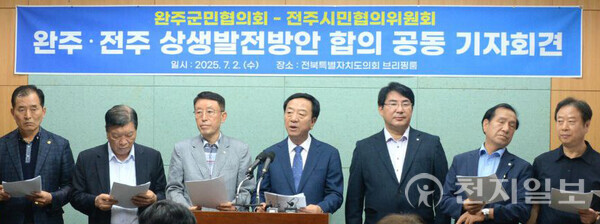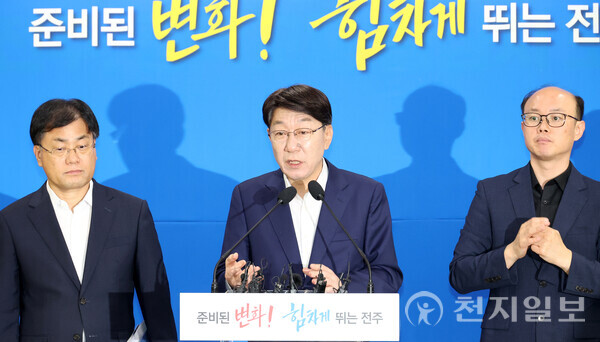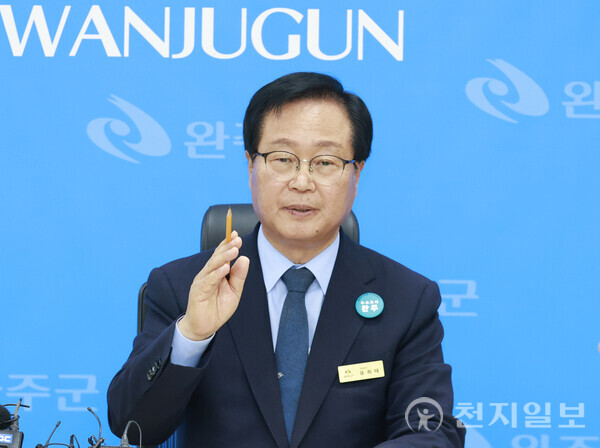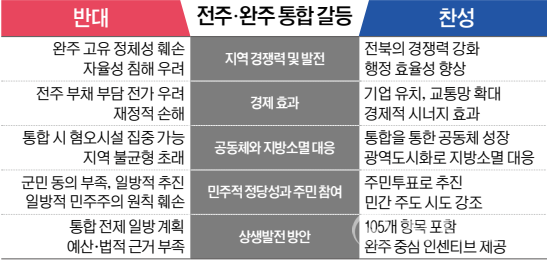Residents shaving heads in protest
Merger debate escalates to resident vote
Distrust and backlash over co-prosperity plan remain
Governor says merger is Jeonbuk’s future
County council firmly opposes unilateral push
![[Cheonji Ilbo Jeonbuk=Reporter Kim Dong-hyun] As conflict deepens between merger supporters citing historical restoration and regional development, and opponents seeking to protect their hometowns, attention is on whether this debate will open Jeonbuk’s future or leave new wounds. Photo shows Wanju residents protesting against the Jeonju-Wanju merger on June 25, ahead of Governor Kim Kwan-young’s planned meeting. ⓒ Cheonji Ilbo 2025.07.08.](https://cdn.newscj.com/news/photo/202507/3291092_3360759_2743.jpg)
[Cheonji Ilbo Jeonbuk=Reporter Kim Dong-hyun] Efforts to merge Jeonju and Wanju in Jeonbuk are intensifying conflicts among residents, local governments, and civic groups. The merger debate, which has repeatedly failed for over 30 years, has now reignited with a resident vote. Proponents emphasize enhanced regional competitiveness and economic synergy, while opponents fear damage to local identity, unfair development, and a lack of democratic legitimacy. As tensions deepen, Jeonbuk stands at a crossroads: will the merger lead to co-growth, or will it leave only new scars?
“Why merge when we’re living just fine now.”
On June 25, ahead of Jeonbuk Governor Kim Kwan-young’s visit, the plaza in front of Wanju County Office was tense from early morning. Hundreds of county residents gathered before large speakers, shouting “No to merger” and banging gongs, as 10 Wanju County Council members shaved their heads in protest.
◆ “Merger only harms us”
The scene in front of the county office was like a battlefield. Hundreds of residents beat gongs and shouted “No to merger.” People wore red headbands, held placards, clashed with police, and shouted slogans until their voices cracked. Their faces showed desperation to ‘protect Wanju.’
Seo Nam-yong, head of the Wanju-Jeonju Anti-Merger Special Committee, criticized, “Governor Kim Kwan-young is pushing for the merger despite fierce opposition from Wanju residents due to his political ambitions.” He added, “Even if it’s more than a resident vote, it will be overwhelmingly rejected,” arguing, “Hiding the results of nine surveys proves how strong our opposition is.”
Assemblywoman Lee Kyung-ae declared, “I shaved my head out of love for Wanju. I will protect Wanju with you.” Assemblyman Shim Bu-geon shouted, “Governor Kim alone cannot take Wanju from us. We will protect Wanju at all costs.” Assemblyman Sung Joong-gi urged, “If we don’t protect Wanju, who will? Let’s show our strength today and remain united.”
Residents adjusted their headbands and unanimously said, “We don’t need a merger.” Yoo Jeom-sun (alias, 65) said, “We’re living fine, and nothing good will come from merging,” adding, “We’ll just end up with incinerators and other unwanted facilities, and if we merge with debt-ridden Jeonju, only we will lose.” She emphasized, “We will never merge. Just let us live as we are.”
Lee Soon-ja (in her 60s) said, “I came out to protect our county and our descendants,” questioning, “When Iksan merged, what good did it bring? Our villages will be filled with unwanted facilities.”
Lee Don-seung, head of the Kim Dae-jung Foundation’s Wanju branch (66, male), said, “They’re here to persuade us. This isn’t a dialogue,” adding, “We’re protesting because we fundamentally need to block this.” He criticized, “The governor should act as mediator and coordinator, but leading the merger is just political greed.” He pointed out, “Jeonju has 600 billion won in debt, which increased by 200 billion in just a year. How can people who can’t manage their own debt help us?” He concluded, “Wanju has surpassed a population of 100,000 and is a blue ocean. Merging with Jeonju is disrespectful to us. The merger will only cause division among residents and should be stopped immediately.”
Governor Kim’s scheduled town hall meeting with residents was ultimately cancelled that day. Even as he left in his vehicle after a press briefing, protests by residents and county council members continued. Protesters surrounded his car, holding placards reading “Protect Wanju! No to merger!” Police were dispatched to clear the scene before the vehicle could leave.
Song Byung-joo, senior representative of the Wanju-Jeonju Anti-Merger Countermeasure Committee, said, “Governor Kim backing down is a small victory, but this isn’t over,” urging, “Please tell your family and neighbors to vote against the merger so we can win the resident vote.”

◆ Will co-prosperity plans resolve it?
The Wanju County Residents’ Council and Jeonju Citizens’ Council recently reached a final agreement on 105 co-prosperity development measures to support the merger. On July 2, they held a press conference at Jeonbuk Provincial Council’s briefing room and urged Jeonbuk Province, Jeonju City, and Wanju County to adopt the plans.
The co-prosperity measures include building the merged city hall and council hall in Wanju and investing all merger incentives in the county, as well as prohibiting the relocation of unwanted or noxious facilities without the consent of Wanju residents. The plans also call for maintaining at least 11 district council members in Wanju for the next 12 years and establishing a new Agriculture Bureau to be headed by a native of Wanju.
Other plans aimed at regional development include attracting major commercial facilities like department stores and shopping malls, extending the BRT route between Eco City and Sambong District, designating four administrative districts in consultation with the Ministry of Interior and Safety, and ensuring fair personnel practices for civil servants.
Park Jin-sang, chair of Jeonju Citizens’ Council, said, “Thank you to everyone who worked with one heart and mind for the merger over the past months,” urging authorities to “actively adopt the plans, considering legal revisions and residents’ demands.”
Na Yoo-in, co-chair of Wanju Residents’ Council, stated, “The merger isn’t about one side getting smaller but about growing together,” adding, “Let’s break down administrative boundaries and build a prosperous community as one.”

◆ “Merger is for Jeonbuk’s future”
Governor Kim Kwan-young and Jeonju Mayor Woo Beom-ki defined the merger as a task for Jeonbuk’s future and the last chance to counter regional extinction, vowing to respect residents’ will.
At his 3rd-anniversary press conference, Governor Kim said, “Jeonbuk is facing new opportunities, and the Jeonju-Wanju merger is an unfinished task we must resolve,” emphasizing, “With the bid to host the 2036 Jeonju Olympics, the passage of the Great Metropolitan Transport Act, and the launch of a new government, the merger has become even more necessary.” He added, “We must ask and answer together what future Jeonju and Wanju will choose. I will prioritize residents’ will and communicate with empathy.”
Regarding the recent failed town hall meeting, he explained, “Going forward, we will create more natural communication opportunities through small group meetings.”
Mayor Woo Beom-ki also emphasized at his 3rd-anniversary press conference, “Jeonju and Wanju must become one again,” calling it “Jeonju’s survival issue amid the massive wave of regional extinction and the last chance to become a metropolitan city.” He added, “The most important thing is communication and understanding,” promising sincere dialogue with Wanju residents in cooperation with civic groups.
Regarding the Wanju County Council’s proposal for a televised debate, he said, “Residents’ will is most important. They need thorough explanations and discussions to make a calm judgment,” adding, “The method and timing will be decided in consultation with the council speaker.”
Mayor Woo later held another press conference on July 7, pledging, “I will communicate with Wanju residents anytime,” and declared Jeonju’s active acceptance of the 105 co-prosperity measures jointly proposed by the councils.
The city plans to categorize the 105 projects into short- and long-term actions, establish implementation plans, and secure funding for projects it can pursue independently. For projects requiring other agencies or the private sector, such as adjusting school districts or attracting large enterprises, hospitals, and commercial facilities, it will continue discussions to ensure smooth progress.
Mayor Woo said, “We have taken another crucial step towards a merger that will completely transform our region’s future,” adding, “This is a different beginning and step because it is a people-driven merger where Wanju residents proposed co-prosperity plans and both residents and citizens are coming together to challenge themselves.” He concluded, “If there are any disadvantages, we will find solutions, and if there are misunderstandings, we will resolve them through dialogue. Jeonju will prioritize residents’ will and pursue a people-driven merger to the very end.”

◆ “Co-prosperity plan is a unilateral pre-merger scheme”
Wanju County Mayor Yoo Hee-tae and the county council strongly criticized the merger push and co-prosperity plans, saying any merger without residents’ consent is unacceptable.
At an emergency press conference on July 3, Mayor Yoo stated, “Wanju has consistently opposed this unilateral merger push, and the 105 co-prosperity plans are merely unilateral pre-merger schemes,” adding, “Merger discussions excluding residents cannot be justified for any reason.”
He criticized the plans for being unilateral, lacking legal basis, concrete timelines, and funding measures, and excluding resident input, warning, “Without sufficient opinion gathering, only certain groups and pro-merger views were reflected, potentially forcing rural residents to shoulder urban debts and leading to unfair outcomes.”
The same day, Council Speaker Yoo Ui-sik and other county council members held a press conference at Jeonbuk Provincial Council, declaring the merger push “a unilateral political move stemming from campaign pledges” and insisting, “A merger without its owners – the residents – must be scrapped.”
The council lamented, “The merger was sparked by Governor Kim and Mayor Woo’s election pledges, not by residents’ demands,” adding, “Over 33,000 residents have petitioned against it, yet they are being ignored.”
They continued, “Claiming residents are uncooperative and making it difficult to talk divides us,” and called for an end to “clinging to this rotten rope of an administrative merger, dragging down all of Jeonbuk.”
The council also proposed a televised debate, saying, “We hope the administrative leaders will join us in an open debate before residents.”

◆ “First and last chance for Jeonbuk’s development”
Na Yoo-in, co-chair of Wanju Residents’ Council, told Cheonji Ilbo in a recent call that the merger push “aims to restore Jeonju and Wanju to their original state after being divided by Japan,” adding, “Unlike previous government-led efforts, this time residents directly initiated the resident vote.”
Na explained, “In 1935, Japan divided Jeonju and Wanju. We formed a Historical Restoration Committee to reverse this. In the past, governors, mayors, and county heads made merger pledges but achieved nothing. We shifted to a resident-led movement because a resident vote must be held two years before the election for the merged city mayor.”
He cited past mergers such as Cheongju-Cheongwon and Gwangju-Gwangsan as examples, arguing, “The global trend is toward metropolitan cities. Merging Jeonju and Wanju will greatly benefit enterprise attraction, education competitiveness, transportation expansion, agriculture, and welfare.”
Regarding the 105 co-prosperity measures, he said, “They include bans on relocating unwanted facilities, moving the merged city hall to Wanju, maintaining and expanding welfare, and guaranteeing personnel rights for public servants,” and emphasized, “Like Cheongju-Cheongwon, a joint monitoring body must be established to continuously check implementation.”
He stressed, “To ensure feasibility, specific budgets, implementation timelines, and legal and ordinance changes must be arranged,” adding, “If this merger fails, Jeonbuk has no future. The Jeonju-Wanju merger is both the first step and the last chance for Jeonbuk’s development.”
The revived merger debate pits calls to restore historical borders against cries to protect cherished hometowns. Whether this merger will become a path of ‘growing together’ or leave deeper wounds dividing the community remains uncertain. Uniting divided public opinion is the starting point for the merger discussion – and Jeonbuk’s greatest challenge.
- [전국인사이드ㅣ전북] “함께 성장” vs “정치 야욕”… 전주·완주 통합 갈등
- [1분컷] “함께 성장” vs “정치 야욕”… 전주·완주 통합 갈등
- [One-Minute Cut] Jeonbuk aimed for “first-class integrity” but remains at third-class for 3 years, innovation urgently needed
- [1분컷] 전북 ‘청렴도 1등급’ 목표했지만… 3년째 3등급, 혁신 시급
- [National Inside | Jeonbuk – Public Officials Status] Jeonbuk Aims for “Top Integrity Level”… Still at Level 3 for 3 Years, Urgent Need for Reform
- [1-Minute Cut] “Achievements in Words Only”… Three Years of Kim Kwan-young’s Administration Marred by Faltering Promises and Policies
- [1분컷] “성과는 말뿐”… 김관영호, 공약과 정책 모두 흔들린 3년
- [Nationwide Inside┃Jeonbuk] “Achievements in Words Only”… Three Years of Kim Kwan-young’s Administration Marred by Faltering Promises and Policies
- [전국인사이드┃전북] “성과는 말뿐”… 김관영호, 공약과 정책 모두 흔들린 3년
- [1-Minute cut] “There’s nothing to do in Jeonju Hanok Village”… The current state of Jeonbuk’s tourism policy missing both ‘taste’ and ‘style’
- [1분컷] “전주한옥마을서 할 게 없다”… ‘맛·멋’ 놓친 전북 관광정책 현주소
- [Nationwide Inside|Jeonbuk(4)] [Field Report] “Nothing to Do in Jeonju Hanok Village”… The Current State of Jeonbuk’s Tourism Policy Missing ‘Taste and Style’
- [전국인사이드|전북(4)] [르포] “전주한옥마을서 할 게 없다”… ‘맛·멋’ 놓친 전북 관광정책 현주소
- [1-Minute cut] [Nationwide Inside|Jeonbuk (3)] [Field Report] “We feel sorry for the kids”… Two Years After the Jamboree Disaster, Has Jeonbuk Changed?
- [1분컷] [전국인사이드|전북(3)] [르포] “고생한 아이들에 미안”… 잼버리 참사 2년, 전북은 달라졌나?
- [Nationwide Inside|Jeonbuk (3)] [Field Report] “We feel sorry for the kids”… Two Years After the Jamboree Disaster, Has Jeonbuk Changed?
- [전국인사이드|전북(3)] [르포] “고생한 아이들에 미안”… 잼버리 참사 2년, 전북은 달라졌나?
- [1-Minute cut] [Nationwide Inside|Jeonbuk(2)] [Field Report] “Saemangeum development serves politicians… 34 years in, residents feel no change”
- [1분컷] [전국인사이드|전북(2)] [르포] “새만금 개발은 정치인 실적용… 개발 34년, 투자 체감도는 제로”
- [Nationwide Inside┃Jeonbuk(2)] [Field Report] “Saemangeum development is a political performance… 34 years in, locals feel no benefit”
- [전국인사이드┃전북(2)] [르포] “새만금 개발은 정치인 실적용… 개발 34년, 투자 체감도는 제로”
- [1-Minute cut] [National Inside|Jeonbuk(1)] The Reality Behind the ‘Special Autonomy’ Title… Youth Are Leaving, and Growth Has Stalled
- [1분컷] [전국인사이드|전북(1)] ‘특별자치’ 이름에 가려진 전북 현실… 청년은 빠지고 성장은 멈췄다
- [National Inside|Jeonbuk(1)] The Harsh Reality Behind the ‘Special Self-Governing’ Name… Youth Are Leaving, and Growth Has Halted
- [전국인사이드|전북(1)] ‘특별자치’ 이름에 가려진 전북 현실… 청년은 빠지고 성장은 멈췄다
- [National InsideㅣJeonbuk–Carbon] Top-Class Infrastructure, Weakest Links… Jeonbuk's Carbon Industry at a Crossroads
- [전국인사이드ㅣ전북–탄소] 인프라는 최고, 연결은 최저… 전북 탄소산업의 기회와 위기
- [1분컷] 인프라는 최고, 연결은 최저… 전북 탄소산업의 기회와 위기
- [1-Minute Cut] Top-tier Infrastructure, Poor Connectivity: Opportunities and Challenges in Jeonbuk’s Carbon Industry
- [전국인사이드ㅣ전북-스마트팜] 농업의 좌표를 다시 묻다… 전북이 만든 ‘정착의 구조’
- [National InsideㅣJeonbuk-Smart Farms] Rethinking the Coordinates of Agriculture… Jeonbuk Builds a ‘Structure for Settlement’
- [1분컷] 농업의 좌표를 다시 묻다… 전북이 만든 ‘정착의 구조’
- [1-Min Brief] Rethinking the Coordinates of Agriculture… Jeonbuk Builds a ‘Structure for Settlement’
- [National InsideㅣJeonbuk] Jeonju–Wanju Merger Conflict for 30 Years… Tug-of-War Between Administrative Efficiency and Local Autonomy
- [1-Minute Cut] Jeonju–Wanju Merger Conflict for 30 Years… Tug-of-War Between Administrative Efficiency and Local Autonomy

